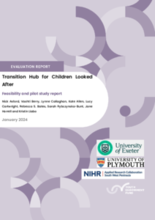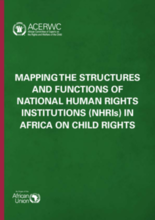Demographic Data
|
Sources: World Bank, UNICEF, UNDP HDR 2015, DHS 2013 |
Displaying 521 - 530 of 14551
Family for Every Child launched its global inter-agency guidance on supporting kinship care aimed at policy makers and programme managers during this webinar on 1 February 2024.
The special issue accepts research on traditional and non-traditional ACEs worldwide, which broadens our understanding of risk and protective ecological factors shaping health outcomes.
Born amid the horrors of the war in Gaza, the month-old baby girl lying in an incubator has never known a parent's embrace. She was delivered by Caesarean section after her mother, Hanna, was crushed in an Israeli air strike. Hanna did not live to name her daughter.
The Evidence for Impact Working Group convenors are looking for an advanced graduate student with solid training in methods and statistics in the behavioral sciences, preferably with some experience in systematic (narrative or meta-analytic) reviews. This work could be done as part of a practicum or as part of a thesis on the topic of de-institutionalization.
Faith to Action has developed a 3-day in-person event for U.S.-based organizations serving orphaned and vulnerable children around the world. The purpose of this event is to enhance your learning and connections in the journey of transitioning from residential care to family-based care.
The first-ever National Kinship Care Strategy has been published. This session aims to explore the implications of the strategy on social work with kinship families and the impact it has on local authority planning, practice and workforce. The panel event will take place online via zoom on Tuesday 30th January 11.30am – 1.30pm.
This is a feasibility and pilot evaluation of the Transition Hub -- a multi-disciplinary team which aims to support young people aged 11 to 17 who are making the transition into care or experiencing a placement transition in England. The feasibility phase explored the feasibility of delivery and aimed to provide lessons for further research. The pilot phase examined whether the Transition Hub might evidence promise on desired outcomes and sought to offer further learning about delivery and acceptability.
ACERWC released a study on the structures and functions of NHRIs on child protection to assess how child rights issues are incorporated in their mandates. The study identifies challenges and proposes areas to strengthen collaboration.
Amy and Ano are twins, but just after they were born they were taken from their mother and sold to separate families.They found out about each other by chance and as they delved into their past, they realised thousands of babies in Georgia were stolen from hospitals and sold for adoption, some as recently as 2005. Now they want answers.
In this webinar, community providers discussed the challenges they face in providing responsive services, including building evidence and operating in the context of restrictive “evidence-based” standards, as well as recommendations for actions state and federal policymakers can take to ensure all families have the support they need through expanding access and availability of programs that are developed by and for communities of color.



